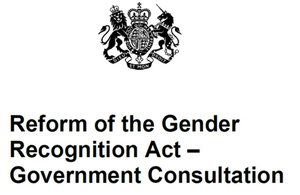Government announces plans to reform process of changing legal gender
Government launches the Gender Recognition Act consultation on how to make it easier for transgender people to change their legal gender on birth certificates.

Government Consultation
- consultation will look to make process of obtaining new birth certificate less intrusive and bureaucratic for transgender people
- government aims to gather evidence to further advance equality for non-binary and intersex people
- plans will not water down Equality Act protections for single-sex services or for trans people
The government has launched a public consultation on the Gender Recognition Act 2004, on how to make it easier for transgender people to change their legal gender on their birth certificate.
The Prime Minister announced the government’s plan to consult on changes to the Gender Recognition Act in 2017.
The government’s LGBT survey – the largest national survey of its kind, with over 108,000 participants – showed there is considerable misunderstanding about the requirements of applying for a Gender Recognition Certificate, and many trans people find it overly bureaucratic and expensive.
The 16-week consultation, which affects England and Wales, will review the process of acquiring a Gender Recognition Certificate – which is given to people who are legally recognised as being of their new gender – and aim to reduce the time and cost for people applying.
The consultation will look at many aspects of the process of obtaining legal recognition, including the requirements for the transgender person to:
- provide 2 medical reports, one showing a diagnosis of ‘gender dysphoria’ and the other outlining details of treatment received
- obtain the consent of their spouse if they are married
- demonstrate that they have lived in their acquired gender for at least 2 years
- pay £140
Prime Minister Theresa May said:
Last year I committed to carrying out a consultation on the Gender Recognition Act and I’m pleased to be able to launch that today.
What was very clear from our survey is that transgender people across the UK find the process of legally changing their gender overly bureaucratic and invasive.
I want to see a process that is more streamlined and de-medicalised – because being trans should never be treated as an illness.
Minister for Women and Equalities Penny Mordaunt said:
The discrimination and bigotry that the trans community currently faces is unacceptable in today’s society – we need a culture change.
In response to our national LGBT survey trans people have told us that the current system to legally change their gender isn’t working and they find the process bureaucratic, costly and intrusive.
We want to help people to thrive and to go about their daily life, living in the gender they choose without intrusion or fear of humiliation.
This consultation is a chance for us to change the current system for the better and I look forward to hearing everyone’s views.
The government has been clear that this consultation will not be making any changes to the Equality Act 2010 and the protections within it. The Act states that individuals must not be discriminated against because they are trans, but that single-sex services such as domestic abuse refuges can provide services in a different way, or exclude a transgender person from the service, if this is proportionate and justified.
The government has not yet taken any decisions and responses to the consultation will be considered very carefully before making any.
Government figures show the number of people who have successfully obtained a Gender Recognition Certificate (4,910) since the legislation came into effect is far fewer than the estimated size of the trans population in the UK.
In recent years, we have made progress in tackling the barriers that transgender people face within the UK. We have:
- introduced a £3m project to help tackle transphobic bullying in schools
- put more money into NHS Gender Identity Services
- conducted one of the largest national surveys of LGBT people in the world, receiving over 14,000 responses from trans and non-binary people
Cara English, Policy Engagement Officer at trans charity Gendered Intelligence, said:
Gendered Intelligence welcomes the government’s plans to make it less difficult to change legal gender. Meaningful reforms to the Gender Recognition Act are desperately needed if we’re going to make the process easier, less bureaucratic and exclusionary for trans and non-binary people.
It’s encouraging to see the government take the needs of LGBTQI people seriously, recognising that the GRA needs to be reformed to make it more transparent for those who need to access it. This consultation is all about highlighting the lived experiences and needs of people disenfranchised from the current GRA and giving value to their voices.
Notes to editors
The Equality Act allows providers to offer single-sex services that exclude trans people so long as it is proportionate to do so and it achieves a legitimate aim. An example of a single-sex service might be a domestic violence refuge for women. The government is aware of many refuge services that are fully trans inclusive, and allow trans women entry, but is also equally aware of services that may, in some circumstances, choose to exclude trans women and instead refer them on to a different service – this is lawful provided it is adequately justified.
The legal recognition process is separate from the pathway that trans people follow to obtain medical treatment that they may wish to have, such as hormones or surgery.
The government will consider the results of the consultation carefully before making any decision on how to reform the GRA. We are not necessarily proposing self-declaration of gender.
We are examining what safeguards could be needed as part of any new legal gender recognition system, and will work closely with the Ministry of Justice to understand the issues specific to prisoners.
We are not proposing to lower the minimum age limit for legal gender recognition below the current age of 18.
Media queries
Contact form https://www.gov.uk/gov...